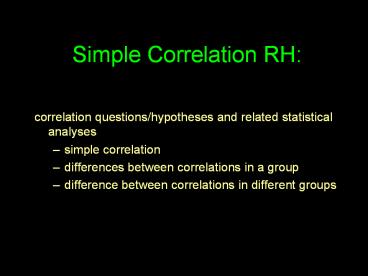Simple%20Correlation%20RH: - PowerPoint PPT Presentation
Title:
Simple%20Correlation%20RH:
Description:
Nasty formulas, but both are in the FZT computator. Kinds of Simple correlation questions, cont. ... Is age a better predictor of social skills for boys than girls? ... – PowerPoint PPT presentation
Number of Views:36
Avg rating:3.0/5.0
Title: Simple%20Correlation%20RH:
1
Simple Correlation RH
- correlation questions/hypotheses and related
statistical analyses - simple correlation
- differences between correlations in a group
- difference between correlations in different
groups
2
- Simple correlation Questions
- 1. Are two variables correlated, within a
specific group? - H0 There is no linear relationship
(correlation) between the practice and
performance in the population represented by the
sample - H0 rperf, prac 0.0
- get used to working with both r (the correlation
between the 2 vars ) and r2 (the variance
shared between the 2 vars) - Performing the significance test
- software will usually provide an exact p-value
(use p lt .05) - a general formula is
- r² N sample size
- F ------------------------
- (1 - r²) / (N - 2) Find
F-critical using df 1 N-2
3
- Kinds of Simple correlation questions, cont.
- 2. Are two correlations different, within a
single group? - Common versions of this question include
- Which is better correlated with performance,
practice or prior skill? - Which is better correlated with practice,
performance or confidence? - H0 The correlation between practice and
performance is the same as between prior skill
and performance, in the population represented
by the sample. - H0 rperf, prac rperf, pskill
- This is a very important test to understand -- it
turns out that it is used with several different
tests of bivariate and multivariate research
hypotheses. - Please note that you will need four pieces of
information to apply those formulas ry,x1 ry,x2
rx1,x2 (corr of variables being compared)
N - Hotellings t-test and Steigers Z-test are used
to answer this question?? Nasty formulas, but
both are in the FZT computator
4
Kinds of Simple correlation questions, cont. 3.
Is a correlation different across two
groups? H0 The correlation between practice
and performance is the same for novice and for
experienced participants H0 rperf, prac for
novices rperf, pract for
experienced This test is very important because
it is used to ask if a correlation value
generalizes across groups or populations -- an
important question for both theory and
application.
5
Identify the kinds of correlation question for
each Is age a better predictor of social skills
for boys than girls? Is age a better predictor
of social skills than SES? Does age predict
social skills? Does IQ predict school
performance? Does IQ predict school performance
better than SES? Does SES predict IQ better for
children or adults?
Is a correlation different across two
populations?
Are two correlations different, within a single
population?
Are two variables correlated, within a specific
population?
Are two variables correlated, within a specific
population?
Are two correlations different, within a single
population?
Is a correlation different across two
populations?
6
1st moment of caution when comparing correlations!
- You have to decide if you are going to compare .
- the correlations of the two predictors
(including sign or -) - or
- the strength, r2, r, or predictive
utility of the two predictors (ignoring the
sign) - For example
- r(98) .35 for correct and confidence ratings
- r(98) -.25 for correct and time to complete
the task - (r -.45 for confidence and time to complete)
- Comparing .35 -.25 yields Z 3.55, p lt .01 ?
different r - Comparing .35 .25 yields Z .63, p gt .05 ?
same r2 - Notice that these questions are equivalent if the
signs of the two correlations are the same!
7
2nd moment of caution when comparing correlations!
- Dont confuse asking
- if each variable is significantly correlated with
the criterion - vs.
- if the variables are differentially correlated
with the criterion - Example
- r(28) .37, p lt .05 for correct and time to
complete the task - r(28) .33, p gt .05 for confidence and time to
complete the task - Although correct is significantly correlated
with time to complete the task and confidence is
not significantly correlated with time to
complete, it is a different question to ask if
the two correlations are significantly different! - Said differently ? There may not be a significant
difference between one significant correlation
and another non-significant correlation.
8
An important variation on this theme
- While it is most common to apply these models to
ask which of two variables is the better
predictor of a given criterion - it is possible to apply them to ask for which
criterion a given variable is the better
predictor. - Often we collect multiple variables that are
considered outcome or criterion variables. If
so, when we talk about how good a predictor is,
it is important to know if the effectiveness of
the predictor depends upon the criterion we are
using. - Remember like in the other applications of
these models - it is different to say that a predictor is
correlated with one criterion and not correlated
with another, than to say it is differentially
correlated with the two! - it is different to ask if two correlations are
significantly different than to ask if the two r2
or r are different































